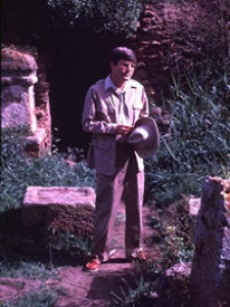
Dr. David Soren is Regents Professor of Anthropology and Classics with the University of Arizona and Director of the Orvieto Institute in Umbria, Italy. He holds a B.A. in Greek & Roman Studies from Dartmouth, and an M.A. in Fine Arts and Ph.D. in Classical Archaeology from Harvard University. His specialties include Roman Archaeology, and the making of documentaries. He has done extensive field work in Cyprus, Portugal, Tunisia and Italy, is widely published, and has received numerous honors and awards for his work. He is a Fellow of Great Britain's Royal Institute of International Affairs and the Johns Hopkins Schools of Advanced International Research. Movies about his work have been featured on a number of networks including the BBC ("Malaria and the Fall of Rome"), The Learning Channel ("A Roman Plague" with John Rhys-Davies) and National Geographic ("Kourion").
Major Publications:
- Art, Popular Culture and the Classical Ideal in the 1930s (Marquee Press: 2011).
- An Ancient Roman Spa at Mezzomiglio, Chianciano Terme, Tuscany, Volume 2, with Dr. Paola Mecchia (British Archaeological Reports, Oxford: 2010).
- An Ancient Roman Spa at Mezzomiglio, Chianciano Terme, Tuscany (British Archaeological Reports, Oxford: 2007).
- Archaeological Excavations at Lugnano in Teverina, Italy (L'Erma Bretschneider, Rome: 2001). Co-edited with Noelle Soren.
- Carthage: A Mosaic of Ancient Tunisia (edited by David Soren and Aicha Ben Abed Ben Khader) (W.W. Norton/Penguin/ American Museum of Natural History: 1987).
- Carthage by David Soren, Aicha Ben Abed Ben Khader and Hedi Slim (Simon and Schuster/ Touchstone: 1990) French Version: Albin-Michel Press, 1992.
- Kourion: The Search for A Lost Roman City by David Soren and Jamie James (Doubleday: 1988).
- Corpus des Mosaiques de Tunisie (Smithsonian Institution: 1980-1992)- co-author three volumes, contributing writer two volumes.
Classes Taught:
- CLAS 300 - Art and the Classical Ideal
- CLAS 329 - Art History of the Cinema
- CLAS 340B - Introduction to Classical Art and Archaeology
- CLAS 452/552 - Etruscan Art and Archaeology
- CLAS 454/554 - Greek and Roman Sculpture
- CLAS 456/556 - Greek and Roman Painting
- CLAS 484/584 - Roman Art and Architecture
- CLAS 596a - Seminar in Roman Architecture
Research Interests:
- Roman and Etruscan archaeology
- Field excavation in Tuscany
- Roman architecture
- Greek and Roman sculpture
- Hollywood cinema and Vaudeville
- Tap dancing
Archaeological Sites:

